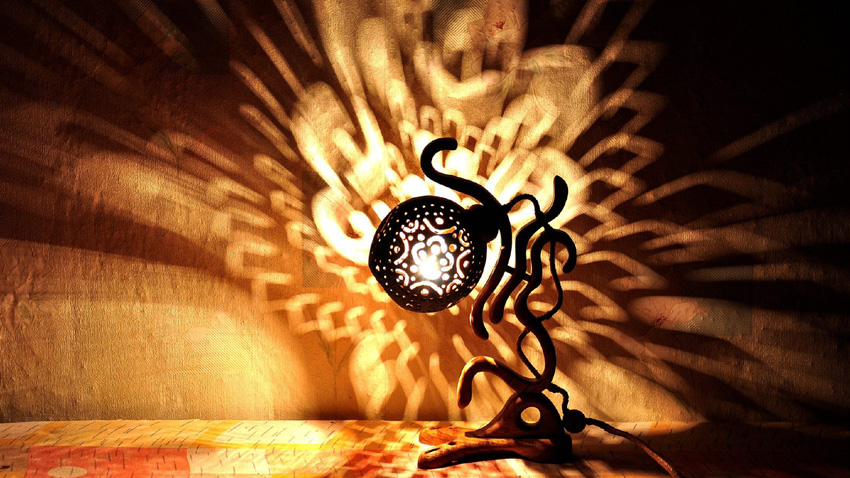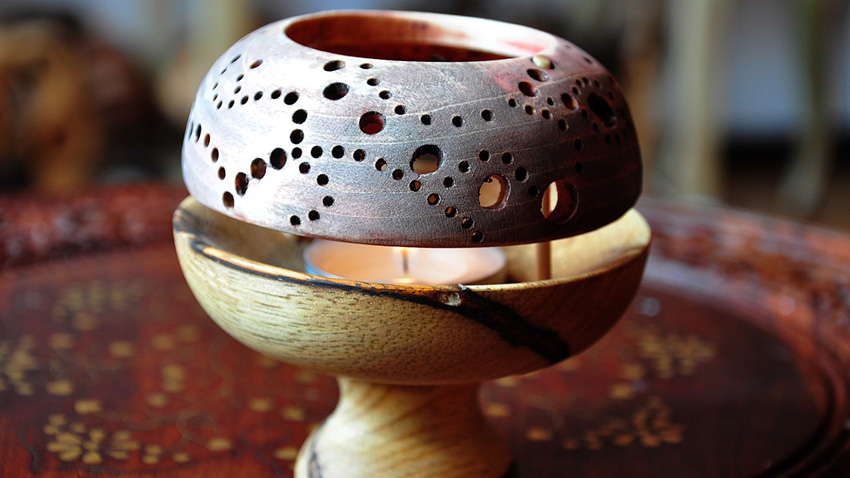“I go to work in a great mood”, Stanimir Ivanov a.k.a. Miro tells us while he takes a walk in the folds of Mount Rila. For three years he has been engaged in woodcarving and has been making various wooden objects - lamps, candlesticks, adornments etc. He lives in the western town of Samokov where his workshop operates. Miro has succeeded in merging with nature and has thus achieved incredible harmony and peace inside.
„Years ago I worked in a carpentry workshop. The square and precise identical shapes of furniture pieces however failed to excite me. I was about to leave but took an order for wine stands that looked a bit more artistic. I ended up make them in weird shapes. This was a discovery for me that revealed to me the beauty of wood. Before that I had been into graphic design. At a certain point though I decided woodcarving should become my job, not just a hobby. Back then I was living in Sofia and arranged a workshop in the basement of my friends. My first pieces were bought by customers in Copenhagen. This gave me an impetus to go on. Now this is my main job. I never have an idea in advance and I do not sketch shapes and figures. Wood shows them to me in the process of work. Shapes in nature provide inspiration to me.”

Miro contends that 21 c. enables more people to engage in art and the internet is a platform helping to find both associates and customers who would appreciate art. The artist sells most of the lovely objects he makes abroad, and the feedback is positive. This kind of art though is not appreciated in Bulgaria, he contends:
„As a matter of interest, I have the most positive feedback from abroad. When people live under stress they are not fine-tuned to see the beauty, and people in Bulgaria live stressed out lifestyles. Electronic sales provide strict statistics that reveal to me that this art is appreciated mostly by people in calmer countries where people's lives are easier.”
Miro makes a living by selling his wooden art pieces. He admits that his workshop is ruled by chaos that adds to the artistic atmosphere of the place. The artist sees in wood a lot of wisdom, and in its circles - years, seasons and destinies. He describes his jobs as therapy that restores his inner harmony. Miro often makes lamps in weird shapes.

„I love to make lamps because they represent a kind of paradoxical coexistence between fire and wood. Wood gives us fire but after this sacrifice it is reduced to ashes. In lamps they live together. I love to play with the shape of a piece of woodand I also love to play with light that beautifully disperses in the dark. I sometimes cannot believe what beautiful pictures shadows and light can draw.”
Miro starts his typical day very early in the morning, with music and yoga. He likes to work with walnut, oak, linden, ofram and fruit trees. He avoids softwood. It is not his practice to make plans for the future, and he feels that he has finally found peace and happiness thanks to art.
English Daniela Konstantinova
Artist Vanya Petkova from Kardzhali paints non-traditional icons, depicting saints on ostrich eggs . She started about 15 years ago with images of Jesus Christ and the Virgin Mary. The first egg she painted is still intact and is kept by her relative...
This year, Orthodox and Catholic Christians will celebrate the Resurrection of Christ togethe r. On the same date, the entire Christian world will turn its gaze to the empty tomb and will try, to the best of its ability, to empathize with the amazement..
A pink pelican has become a real attraction for the residents of Varna. Hundreds of people have spotted it in the area of the Marine Station in the coastal city and rushed to post his photos on social networks. The pelican is already known there by the..
A pink pelican has become a real attraction for the residents of Varna. Hundreds of people have spotted it in the area of the Marine Station in the..
This year, Orthodox and Catholic Christians will celebrate the Resurrection of Christ togethe r. On the same date, the entire Christian world will turn..
Artist Vanya Petkova from Kardzhali paints non-traditional icons, depicting saints on ostrich eggs . She started about 15 years ago with images of Jesus..

+359 2 9336 661
